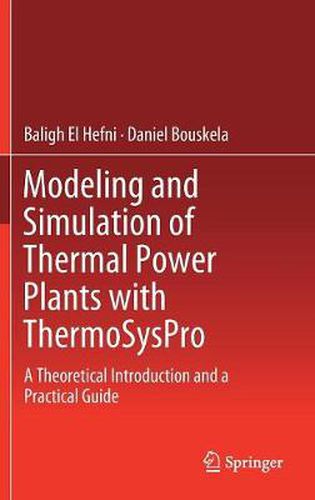Readings Newsletter
Become a Readings Member to make your shopping experience even easier.
Sign in or sign up for free!
You’re not far away from qualifying for FREE standard shipping within Australia
You’ve qualified for FREE standard shipping within Australia
The cart is loading…






This title is printed to order. This book may have been self-published. If so, we cannot guarantee the quality of the content. In the main most books will have gone through the editing process however some may not. We therefore suggest that you be aware of this before ordering this book. If in doubt check either the author or publisher’s details as we are unable to accept any returns unless they are faulty. Please contact us if you have any questions.
This book explains the modelling and simulation of thermal power plants, and introduces readers to the equations needed to model a wide range of industrial energy processes. Also featuring a wealth of illustrative, real-world examples, it covers all types of power plants, including nuclear, fossil-fuel, solar and biomass. The book is based on the authors’ expertise and experience in the theory of power plant modelling and simulation, developed over many years of service with EDF. In more than forty examples, they demonstrate the component elements involved in a broad range of energy production systems, with detailed test cases for each chemical, thermodynamic and thermo-hydraulic model. Each of the test cases includes the following information: *
component description and parameterization data; *
modelling hypotheses and simulation results; *
fundamental equations and correlations, with their validity domains; *
model validation, and in some cases, experimental validation; and *
single-phase flow and two-phase flow modelling equations, which cover all water and steam phases. A practical volume that is intended for a broad readership, from students and researchers, to professional engineers, this book offers the ideal handbook for the modelling and simulation of thermal power plants. It is also a valuable aid in understanding the physical and chemical phenomena that govern the operation of power plants and energy processes.
$9.00 standard shipping within Australia
FREE standard shipping within Australia for orders over $100.00
Express & International shipping calculated at checkout
This title is printed to order. This book may have been self-published. If so, we cannot guarantee the quality of the content. In the main most books will have gone through the editing process however some may not. We therefore suggest that you be aware of this before ordering this book. If in doubt check either the author or publisher’s details as we are unable to accept any returns unless they are faulty. Please contact us if you have any questions.
This book explains the modelling and simulation of thermal power plants, and introduces readers to the equations needed to model a wide range of industrial energy processes. Also featuring a wealth of illustrative, real-world examples, it covers all types of power plants, including nuclear, fossil-fuel, solar and biomass. The book is based on the authors’ expertise and experience in the theory of power plant modelling and simulation, developed over many years of service with EDF. In more than forty examples, they demonstrate the component elements involved in a broad range of energy production systems, with detailed test cases for each chemical, thermodynamic and thermo-hydraulic model. Each of the test cases includes the following information: *
component description and parameterization data; *
modelling hypotheses and simulation results; *
fundamental equations and correlations, with their validity domains; *
model validation, and in some cases, experimental validation; and *
single-phase flow and two-phase flow modelling equations, which cover all water and steam phases. A practical volume that is intended for a broad readership, from students and researchers, to professional engineers, this book offers the ideal handbook for the modelling and simulation of thermal power plants. It is also a valuable aid in understanding the physical and chemical phenomena that govern the operation of power plants and energy processes.